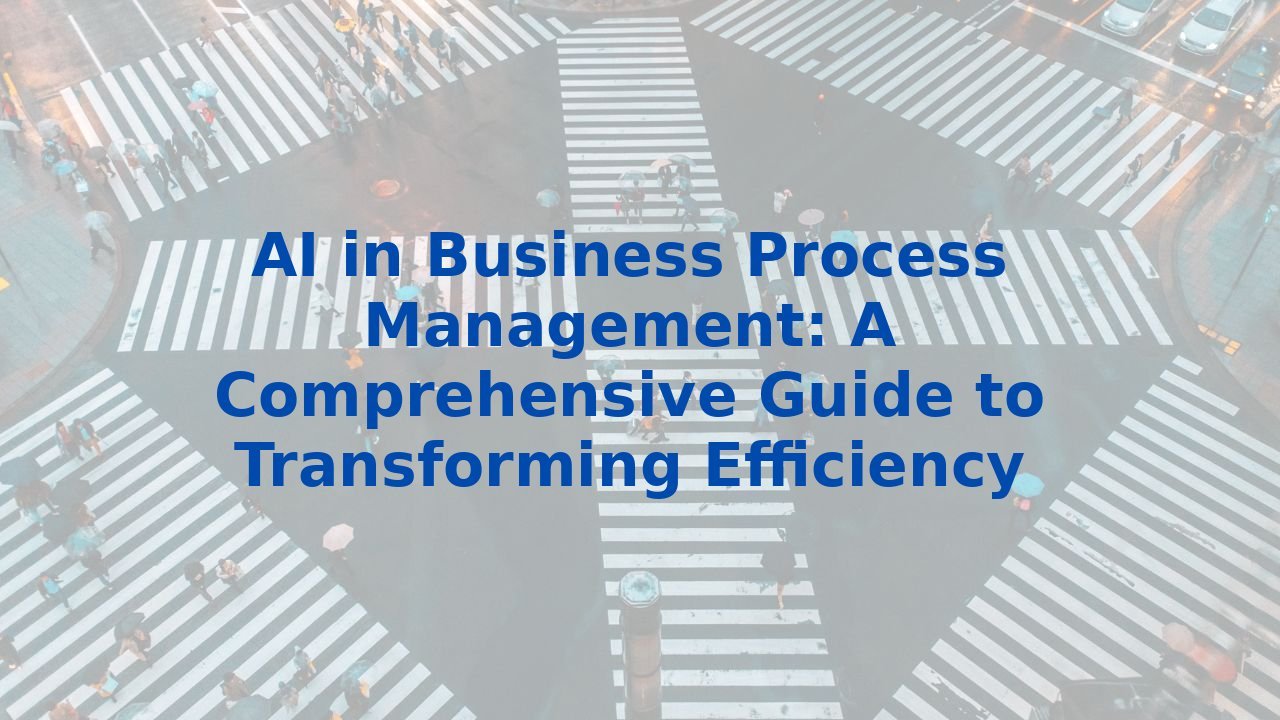AI in Business Process Management: A Comprehensive Guide to Transforming Efficiency
AI in Business Process Management: A Comprehensive Guide to Transforming Efficiency
In today’s fast-paced business landscape, organizations are on a relentless quest for better efficiency, reduced costs, and sharper decision-making. Enter Artificial Intelligence (AI)—a transformative force reshaping how businesses operate. This comprehensive guide delves into how AI is enhancing business processes and driving organizational efficiency.
Understanding Business Process Management (BPM)
Business Process Management (BPM) has evolved into a cornerstone of effective management since its emergence in the late 1980s. BPM's primary goal is to streamline operational processes, enhance productivity, and improve quality. It encompasses a cycle of analyzing, optimizing, and, where necessary, automating business processes to yield better outcomes.
How AI Enhances BPM
AI is fundamentally reworking BPM by enabling businesses to achieve unprecedented levels of productivity, cost reduction, and improved decision-making. Here’s how AI is driving this transformation:
- Data Analysis and Visualization: AI can analyze vast data sets far more quickly than human analysts, uncovering trends and patterns that might otherwise go unnoticed. This capability leads to more informed tactical and strategic decisions.
- Process Building and Automation: By automating previously manual tasks, AI saves companies time and energy. For instance, in document processing, AI can turn raw documents into actionable data without intervention, freeing up valuable human resources.
- Real-Time Monitoring and Optimization: AI-enabled process mining allows organizations to observe their processes in real-time, quickly identifying deviations or anomalies. This empowers businesses to respond swiftly to issues as they arise, maximizing efficiency.
- Predictive Analytics and Risk Management: By leveraging historical data, AI predicts future outcomes and potential risks, making it an invaluable tool for detecting bottlenecks and responding proactively to market fluctuations.
AI Applications in Specific Business Processes
AI finds applications across numerous business processes, ranging from core functions like production and marketing to support roles such as request management and procurement.
- Sales and Marketing: AI streamlines the sales process by automating administrative tasks and suggesting optimal sales channels. It enhances customer relationship management (CRM) systems by providing predictive insights into customer behavior.
- Customer Service: In customer service departments, AI analyzes feedback and automatically inputs relevant data into ticketing systems, facilitating smoother human interactions. Chatbots also provide immediate responses to common inquiries, enhancing customer satisfaction.
- Human Resources: AI assists HR teams by improving recruitment processes. It increases objectivity, enhances employee experiences, and streamlines initial candidate assessments, effectively reducing hiring time and effort.
Benefits of Training Employees for AI
As organizations integrate AI into their operations, it’s crucial to prepare employees to work alongside these technologies. Benefits of training programs include:
- Enhanced Decision-Making: Educated employees gain the skills to interpret AI-driven insights, leading to more informed decision-making. Understanding data analytics can significantly elevate a team's strategic capabilities.
- Improved Collaboration: Training fosters an environment of collaboration, enabling teams to integrate AI insights into their workflows, ensuring alignment among stakeholders.
- Adaptability and Innovation: Employees proficient in AI tools are better equipped to embrace new technologies and processes. Their innovative mindset encourages fresh applications of AI within their daily tasks, driving continuous improvement.
Conclusion
AI is redefining business processes through enhanced data analytics, automation, and real-time monitoring. The implications are clear: organizations that embrace AI can expect significant improvements in efficiency, productivity, and performance. However, integrating AI isn't solely about technology; it necessitates preparing your workforce. Training employees to utilize AI effectively ensures they can translate insights into action, fostering a culture of adaptability and resilience. By combining AI technology with robust training initiatives, companies will be well-positioned to thrive in an ever-evolving business landscape.



